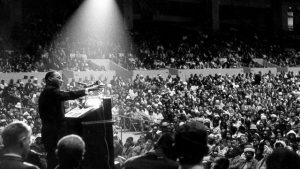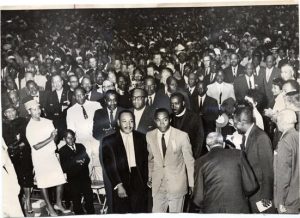As a lawyer and communications professional words are one the tools we use to persuade, convince and resolve. We rely on court opinions and written statutory law enacted by legislative process. We rely on words from prior court cases and prior generations that might use words we find offensive or off-putting now. We reference our time and shape our vision of the world with words and phrases. We learn from the words of the past about how things were then and how they are different now. In my tradition, some of those words were written thousands of years ago.
I have hesitated to publish or submit to the MLK archives the speech my father gave after he returned from the Selma march in 1964 because his words, like those of Dr. King at the time, are different than words we use now. He was asked to give a speech to the wider community about his experiences. But I have concluded that his speech belongs in the MLK archives so that his perspective is preserved for future generations. Without context, we cannot fully understand the effort and its progression, even if the words used then are dissonant now.
I thought this week about what Dr. King must have thought as my parents brought me and older brother into that small room in San Francisco to meet Dr. King and Ralph Abernathy. I can imagine the respect he had for my father to bring his children along in this historic fight, and take us to the Cow Palace (photo attached) later that night to sit with thousands of civil rights activists and supporters as the battle lines for equality were being drawn. As I sat in the audience with my family while my dad was on the podium with Dr. King, I didn’t notice at all that we were a super minority that night.
 Louise Rosen Byer Blog
Louise Rosen Byer Blog



